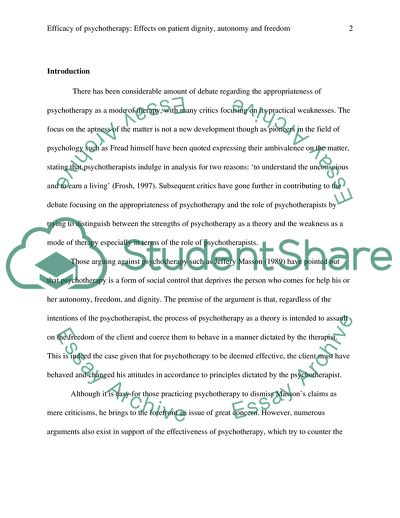Cite this document
(Efficacy of Psychotherapy Coursework Example | Topics and Well Written Essays - 2000 words, n.d.)
Efficacy of Psychotherapy Coursework Example | Topics and Well Written Essays - 2000 words. Retrieved from https://studentshare.org/psychology/1807036-critically-discuss-the-statement-the-structure-of-psychotherapy-is-such-that-no-matter-how-kindly-a-person-is-when-the-person-becomes-a-psychotherapist-he-or-she-is-engaged-in-acts-that-are-bound-to-diminish-the-dignity-autonomy-and-freedom-of-t
Efficacy of Psychotherapy Coursework Example | Topics and Well Written Essays - 2000 words. Retrieved from https://studentshare.org/psychology/1807036-critically-discuss-the-statement-the-structure-of-psychotherapy-is-such-that-no-matter-how-kindly-a-person-is-when-the-person-becomes-a-psychotherapist-he-or-she-is-engaged-in-acts-that-are-bound-to-diminish-the-dignity-autonomy-and-freedom-of-t
(Efficacy of Psychotherapy Coursework Example | Topics and Well Written Essays - 2000 Words)
Efficacy of Psychotherapy Coursework Example | Topics and Well Written Essays - 2000 Words. https://studentshare.org/psychology/1807036-critically-discuss-the-statement-the-structure-of-psychotherapy-is-such-that-no-matter-how-kindly-a-person-is-when-the-person-becomes-a-psychotherapist-he-or-she-is-engaged-in-acts-that-are-bound-to-diminish-the-dignity-autonomy-and-freedom-of-t.
Efficacy of Psychotherapy Coursework Example | Topics and Well Written Essays - 2000 Words. https://studentshare.org/psychology/1807036-critically-discuss-the-statement-the-structure-of-psychotherapy-is-such-that-no-matter-how-kindly-a-person-is-when-the-person-becomes-a-psychotherapist-he-or-she-is-engaged-in-acts-that-are-bound-to-diminish-the-dignity-autonomy-and-freedom-of-t.
“Efficacy of Psychotherapy Coursework Example | Topics and Well Written Essays - 2000 Words”. https://studentshare.org/psychology/1807036-critically-discuss-the-statement-the-structure-of-psychotherapy-is-such-that-no-matter-how-kindly-a-person-is-when-the-person-becomes-a-psychotherapist-he-or-she-is-engaged-in-acts-that-are-bound-to-diminish-the-dignity-autonomy-and-freedom-of-t.


